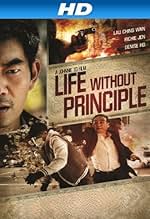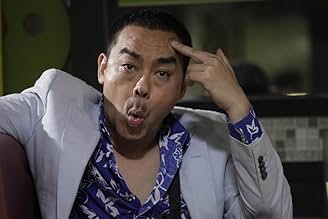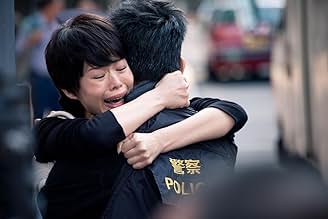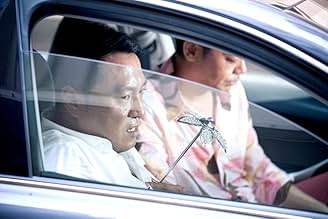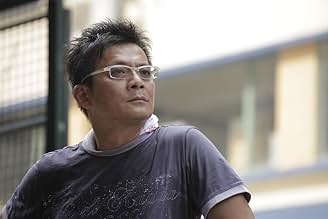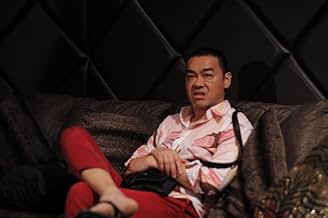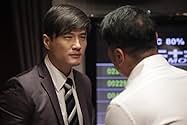AVALIAÇÃO DA IMDb
6,9/10
2,9 mil
SUA AVALIAÇÃO
Neste suspense, o mundo financeiro leva três pessoas desesperadas e muito diferentes umas das outras a arriscarem tudo.Neste suspense, o mundo financeiro leva três pessoas desesperadas e muito diferentes umas das outras a arriscarem tudo.Neste suspense, o mundo financeiro leva três pessoas desesperadas e muito diferentes umas das outras a arriscarem tudo.
- Prêmios
- 17 vitórias e 28 indicações no total
Ching-Wan Lau
- Panther
- (as Ching Wan Lau)
Richie Jen
- Inspector Cheung
- (as Richie Ren)
Eddie Cheung
- Wah
- (as Siu-Fai Cheung)
Siu-Kay Lee
- Brother Four
- (as Siu-Kei Lee)
Avaliações em destaque
I'll start by stating that I'm a big fan of Johnnie To; I love his gangster stuff and his way of telling stories based on ramifications of character decisions, rather than a God of Fate who seems to propel 90% of American films. You could say that it's his trade mark and partly what makes his films so intense and realistic.
Life Without Principle doesn't break this cycle - it has great characters and believable situations, but it just doesn't all come together.
The story told via three separate characters who all intersect thanks to a bag full of money, what mainly drags it down is the scenes being too long. To tries to emphasise on how money and/or greed cause so many problems, and in the process we're dragged through 20 minutes of dull banking set inside one small room before the story switches to focus on the real story.
The next character then runs around town trying to squeeze cash from everybody... again, hitting us with a sense of repetition that will test the patience of many a viewer. Bizarrely, Mr. Sung - the excellent villain we've come to expect from a To film - is introduced right at the end and all I could wonder was, "How different would this film have been had he been in it sooner?"
And that was the problem: too much preaching and not enough entertainment.
Life Without Principle doesn't break this cycle - it has great characters and believable situations, but it just doesn't all come together.
The story told via three separate characters who all intersect thanks to a bag full of money, what mainly drags it down is the scenes being too long. To tries to emphasise on how money and/or greed cause so many problems, and in the process we're dragged through 20 minutes of dull banking set inside one small room before the story switches to focus on the real story.
The next character then runs around town trying to squeeze cash from everybody... again, hitting us with a sense of repetition that will test the patience of many a viewer. Bizarrely, Mr. Sung - the excellent villain we've come to expect from a To film - is introduced right at the end and all I could wonder was, "How different would this film have been had he been in it sooner?"
And that was the problem: too much preaching and not enough entertainment.
Written by Cheung Ka Kit, Yau Nai Hoi and Yip Tin Shing, Life Without Principle aims itself squarely at financial markets and the corrupt ecosystem at play, and spends a significant first arc in combining often heard and experienced elements into the story. Denise Ho plays Teresa, a banking relationship officer measured by her sales figures, which means the more she pushes for the sales of riskier products, the better her commission and profitability to the bank. We understand her pressure and predicament, but one's values of caution gets thrown out the window when one's job is on the line, made worse by a pushy manager. Late nights and cold calls (getting the treatment any of us will usually dish out) become the norm, and having two key customers in Lo Hoi Pang's shady money-lender, an extremely savvy investor but of course, and in So Hang Shuen's heartland elderly woman who has little knowledge of finance other than to put her money in the bank, provided that opportunity for broad contrast in customers who know how to work the bank, and those who the bank knows how to work.
You'll even come to the belief that banks everywhere provides meagre, negligible savings interest rate only to entice you to its complicated, though sexier financial instruments that scream high returns, but comes with the fine print the thickness of a phone directory and print that only an ant could read. But that won't translate well on film, so a similar element in taped conversations and going through the motion, which many of us are susceptible to, get played out instead. You can't help but to shake your head at what's put on screen as a third person witnessing how things develop, although how many of us can say we won't get tempted when actually put in the same hot seat with the promise of money being made thrown at us, that will come with a signature and a trust that the bank, a business entity that exists to make profits from anyone, anything and anywhere, has your interest at heart?
The other major arc is equally brilliant with To retaining the gangster element in his stories, with Lau Ching Wan starring as a non too bright gangster muscle, loyal to a fault and always there for his sworn brothers. His honest nature makes him the unofficial trusted treasurer of this boss, in a time where even gangsters have problems with recruiting and retaining men, who will walk off at the first signs of trouble. So much for loyalty these days, with the attitudes of the strawberry generation being felt even to the underworld.
Fans of Lau Ching Wan will undoubtedly see some shades of a popular character he played for in one of the blockbuster television series of its day involving the financial markets, especially in a build up to an ironic twist, but he also added some performing layers to his character and somehow his simpleton endears. His role here serves to highlight how even gangster have to change with the times of economic uncertainty, where knives and guns get traded off for computers and market savvy, making money through the push of a button rather than the heydays of fighting for territory and seeking one's riches through the traditional revenue pipelines of prostitution, gambling and drugs. It took quite a while to get to where it was supposed to, but as the adage goes it's never about the destination but the journey, where Lau mesmerizes with his performance in a one man tour de force, and a slew of Milkyway regulars, with the conspicuously absence of Lam Suet, surely made this arc the best of the lot, from Eddie Cheung, Felix Wong, Law Wing Cheong, and a whole lot of others springing up to lend support.
And the last arc may serve as a filler since it's the most spread out of the three, but no less satisfying, and I thought it was easily identifiable here since it speaks directly at our pursuit of economic aspiration and the incredible long hours at work we put. Ritchie Jen stars Cheung the cop whose wife Connie (Myolie Wu) desires that swanky new condominium that they can barely afford its mortgage. Living within or beyond one's means is a decision the couple has to take, although in Cheung's case, he seems to be more at home spending time at work, rather than to address his deteriorating personal life, until an incident, as always, puts things back into proper perspective.
While the narrative is presented in a non-linear fashion, the narrative is incredibly easy to follow, with each significant moment setting the pace for those that follow, or to provide the audience with the sense of "if only he/she knew", which in fact is exactly what our attitudes are in life when we sit down to analyze seemingly disparate issues, and how close they each come toward one another than we could have had imagined. Here the Greek economic crisis, something so macro and relatively far away, shows how closely inter-connected we all are in today's global village, where concerns and decisions made thousands of miles away can impact the individual man in profound ways.
Life Without Principle is a carefully crafted film that can work anywhere, but I'm glad Johnnie To got to it first, and provided one thought-provoking and gripping film that is wonderfully contemporary. Certainly one of the best films of the year, and is highly recommended. I'll probably dip into the DVD as well for its original Cantonese language track when the time comes, to view this just as it was intended.
You'll even come to the belief that banks everywhere provides meagre, negligible savings interest rate only to entice you to its complicated, though sexier financial instruments that scream high returns, but comes with the fine print the thickness of a phone directory and print that only an ant could read. But that won't translate well on film, so a similar element in taped conversations and going through the motion, which many of us are susceptible to, get played out instead. You can't help but to shake your head at what's put on screen as a third person witnessing how things develop, although how many of us can say we won't get tempted when actually put in the same hot seat with the promise of money being made thrown at us, that will come with a signature and a trust that the bank, a business entity that exists to make profits from anyone, anything and anywhere, has your interest at heart?
The other major arc is equally brilliant with To retaining the gangster element in his stories, with Lau Ching Wan starring as a non too bright gangster muscle, loyal to a fault and always there for his sworn brothers. His honest nature makes him the unofficial trusted treasurer of this boss, in a time where even gangsters have problems with recruiting and retaining men, who will walk off at the first signs of trouble. So much for loyalty these days, with the attitudes of the strawberry generation being felt even to the underworld.
Fans of Lau Ching Wan will undoubtedly see some shades of a popular character he played for in one of the blockbuster television series of its day involving the financial markets, especially in a build up to an ironic twist, but he also added some performing layers to his character and somehow his simpleton endears. His role here serves to highlight how even gangster have to change with the times of economic uncertainty, where knives and guns get traded off for computers and market savvy, making money through the push of a button rather than the heydays of fighting for territory and seeking one's riches through the traditional revenue pipelines of prostitution, gambling and drugs. It took quite a while to get to where it was supposed to, but as the adage goes it's never about the destination but the journey, where Lau mesmerizes with his performance in a one man tour de force, and a slew of Milkyway regulars, with the conspicuously absence of Lam Suet, surely made this arc the best of the lot, from Eddie Cheung, Felix Wong, Law Wing Cheong, and a whole lot of others springing up to lend support.
And the last arc may serve as a filler since it's the most spread out of the three, but no less satisfying, and I thought it was easily identifiable here since it speaks directly at our pursuit of economic aspiration and the incredible long hours at work we put. Ritchie Jen stars Cheung the cop whose wife Connie (Myolie Wu) desires that swanky new condominium that they can barely afford its mortgage. Living within or beyond one's means is a decision the couple has to take, although in Cheung's case, he seems to be more at home spending time at work, rather than to address his deteriorating personal life, until an incident, as always, puts things back into proper perspective.
While the narrative is presented in a non-linear fashion, the narrative is incredibly easy to follow, with each significant moment setting the pace for those that follow, or to provide the audience with the sense of "if only he/she knew", which in fact is exactly what our attitudes are in life when we sit down to analyze seemingly disparate issues, and how close they each come toward one another than we could have had imagined. Here the Greek economic crisis, something so macro and relatively far away, shows how closely inter-connected we all are in today's global village, where concerns and decisions made thousands of miles away can impact the individual man in profound ways.
Life Without Principle is a carefully crafted film that can work anywhere, but I'm glad Johnnie To got to it first, and provided one thought-provoking and gripping film that is wonderfully contemporary. Certainly one of the best films of the year, and is highly recommended. I'll probably dip into the DVD as well for its original Cantonese language track when the time comes, to view this just as it was intended.
10lyx-1
I really don't understand the low ratings for this superb film. This is one of the most brilliant films about the current state of the world as reflected in Hong Kong society I've seen, especially as an indictment against the financial markets and banks, as exemplified in the cold reptilian nature of the female banker. The non-plot is seamlessly woven, though there's a tribute to Kieslowski here, and To coaxed great performances from most of his cast. The interwoven lives are gripping in their own roller-coaster way, as fortunes ride up and down not unlike the stock market. The only disappointment for me was the ending - I did not expect that of To, but again, it could have been the nod to Kieslowski that he wrapped it up the way he did.
Crime drama surrounding financial crisis's , with classic Johnnie To themes ...
------- Movie follows multiple characters (officer, bank clerk, gangster) connected to a loan shark's death . 10 million dollars are missing in the process ..
Same time officer's wife and their foster child are looking for a home in an unstable housing market.. The bank clerk is signing people up for high-risk investments that are bound to fail.. And the gangster has luck for being the bail-out service boy , sole purpose to bail other gangsters out of the trouble they cause for themselves ..
Some investigating, robberies, car break-ins, funny police arrests, rose-petal daggers, stolen money femme ...... Johnnie To elements ..
7/10
------- Movie follows multiple characters (officer, bank clerk, gangster) connected to a loan shark's death . 10 million dollars are missing in the process ..
Same time officer's wife and their foster child are looking for a home in an unstable housing market.. The bank clerk is signing people up for high-risk investments that are bound to fail.. And the gangster has luck for being the bail-out service boy , sole purpose to bail other gangsters out of the trouble they cause for themselves ..
Some investigating, robberies, car break-ins, funny police arrests, rose-petal daggers, stolen money femme ...... Johnnie To elements ..
7/10
This is certainly a departure from Johnnie To's usual work, but nonetheless, it is a film that is easy to like and relate. With the Greek financial crisis as the backdrop for a story about greed, human nature and life. It is one of those films that does not feel like a complete episode, but rather the sums of its parts. What I like about To's film is that they are so efficient and there is also recurring themes in all his films – life is about taking chances, random events of luck, expect the unexpected and the human nature of greed. His ability to present simple stories into a smooth cinematic experience is simply wonderful to endure. Although the film breaks no new grounds on the topic of greed in the financial market and especially Hong Kong people, it is still a worthy addition to 2011's HK cinema. Perhaps two words that best describe this film would be - simple and efficient. After all, as Mr. Geeko used to say - "Greed is good"...
Neo rates it 7.5/10
Neo rates it 7.5/10
- www.thehkneo.com
Você sabia?
- CuriosidadesDebuted at the second spot of the Hong Kong box office and held the position in its second week.
- ConexõesReferenced in Mo ngai: To Kei Fung dik din ying sai gaai (2013)
Principais escolhas
Faça login para avaliar e ver a lista de recomendações personalizadas
- How long is Life Without Principle?Fornecido pela Alexa
Detalhes
- Data de lançamento
- País de origem
- Centrais de atendimento oficiais
- Idioma
- Também conhecido como
- Đoạt Mệnh Kim
- Empresas de produção
- Consulte mais créditos da empresa na IMDbPro
Bilheteria
- Faturamento bruto mundial
- US$ 1.203.873
- Tempo de duração1 hora 47 minutos
- Cor
- Mixagem de som
- Proporção
- 2.35 : 1
Contribua para esta página
Sugerir uma alteração ou adicionar conteúdo ausente

Principal brecha
By what name was Life Without Principle (2011) officially released in Canada in English?
Responda


